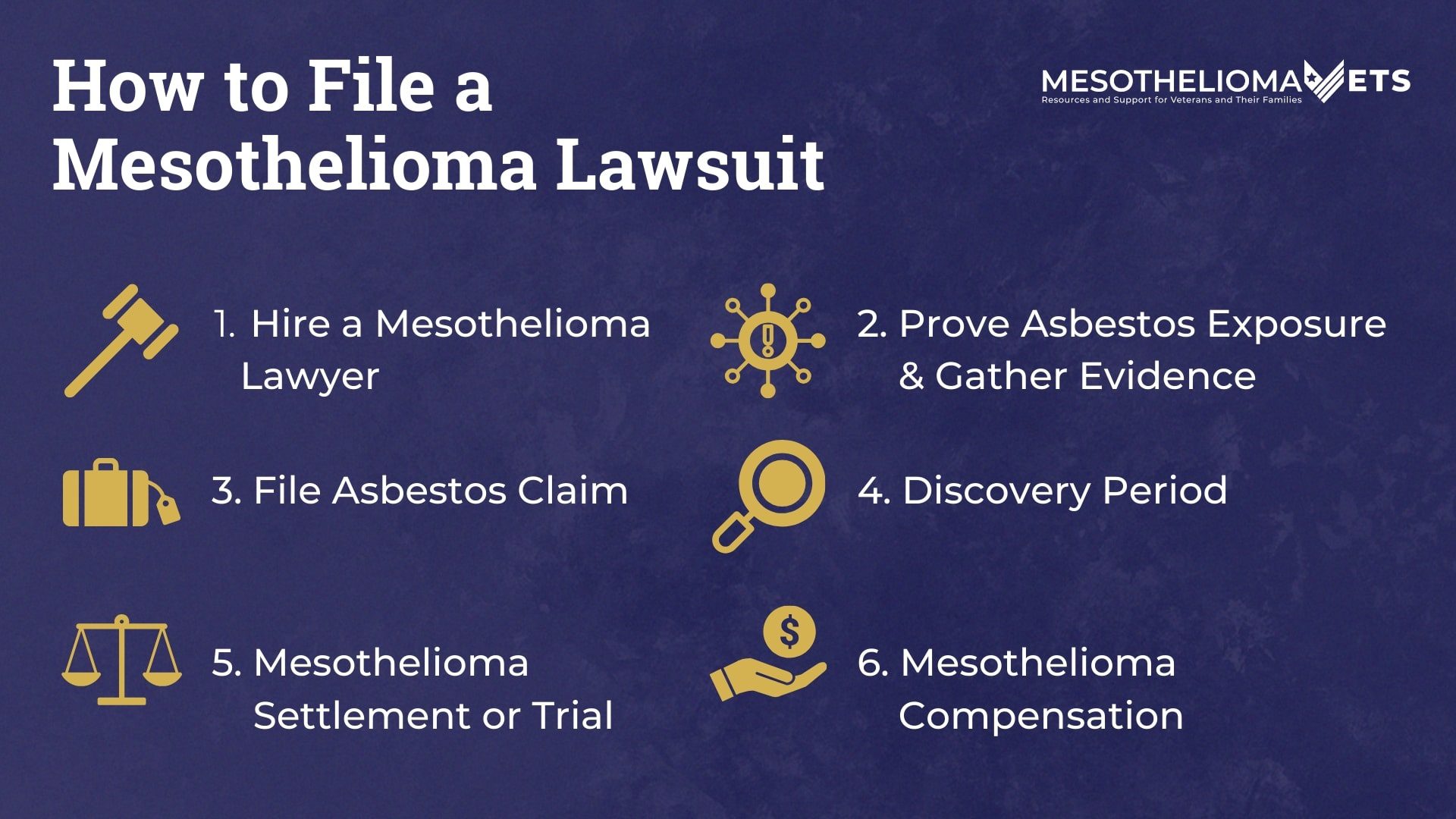Mesothelioma Lawsuits and Veterans
Veterans with mesothelioma may decide to file a lawsuit against the asbestos company responsible for their exposure.

Veterans and Mesothelioma Lawsuits
Veterans have access to mesothelioma lawsuits and a wide range of other legal recourses that can be pursued in the courts. Some common legal outcomes that can come of pursuing a mesothelioma or related lawsuit include compensation. Veterans with mesothelioma, specifically, are typically eligible to receive financial compensation either from a mesothelioma trust fund or directly from the company responsible for their asbestos exposure.
If the asbestos company or negligent manufacturer still exists, your attorney can do this by filing a lawsuit in an attempt to receive a settlement. If the asbestos company goes bankrupt, mesothelioma trust funds will be set up to compensate present and future victims. Finding a mesothelioma lawyer, however, can be tricky, especially for active military members, as time constraints can give way to other life habits instead. In this article, we will discuss how veterans can pursue legal aid through a mesothelioma lawsuit and how veterans nationwide can use this resource to give them an edge before pursuing legal representation.
Types of Mesothelioma Lawsuits
When it comes the types of legal recourse and mesothelioma lawsuits a veteran can pursue, it can boiled down into one of two types, personal injury and wrongful death. Typically wrongful death lawsuits are filed once the victim has passed and on behalf of the deceased’s estate while in personal injury lawsuits, the veteran is still alive. Review about more context below into these two types of lawsuits veterans can pursue.
- Personal Injury: Veterans living with mesothelioma file this type of claim. The winnings from personal injury lawsuits may provide compensation for medical treatment, lost wages, and any pain and suffering that has occurred as a result of the patient’s illness. If the patient dies before the lawsuit is resolved, the case does not end; it continues in the name of the estate.
- Wrongful Death: Family members may pursue this wrongful death lawsuit after the death of a loved one from mesothelioma. The winnings from a mesothelioma wrongful death lawsuit may provide money for medical bills, loss of income, hospice care, and funeral expenses.
How to File a Mesothelioma Lawsuit: The Legal Process
In order to pursue a lawsuit against an asbestos company or company in charge of your exposure, you must have medical proof of a mesothelioma diagnosis and proof of asbestos exposure. In most cases, it is easy to prove the diagnosis: the patient either has mesothelioma (or another asbestos-caused illness) or does not. However, asbestos lawsuits involve more than just a diagnosis. The more significant challenge is proving that a specific asbestos company’s products caused the cancer. Proof of exposure can be difficult if the patient can’t remember which asbestos-containing products they encountered on the job.
Attorneys who specialize in mesothelioma litigation have access to an extensive database of asbestos products, including company logos and product packaging. These images can help patients who have trouble remembering which asbestos products they were exposed to. The database is extremely comprehensive, and most of the products can be traced back to individual job sites or military installations. You don’t have to go through the identification process alone — you’ll have a team of patient advocates and asbestos product experts available to help.
Your legal team will need to determine the length of time and amount of asbestos you were exposed to, locate and question witnesses, and secure expert testimony if needed. It typically takes about six months to gather all the information for a mesothelioma case. Factors that can affect the legal process for mesothelioma lawsuits include:
- The patient’s age at diagnosis
- The patient’s exposure history
- The available legal venues
Veterans who were diagnosed with mesothelioma may be eligible for VA compensation. Find out now.

What is the Statute of Limitations for a Mesothelioma Lawsuit?
Each state has a set timeframe during which claims must be filed. The legal term for this timeframe is the “statute of limitations,” and it begins at the time of diagnosis. The average statute of limitations for mesothelioma is two to three years, so it’s important to contact a mesothelioma law firm as early as possible.
In some states, the mesothelioma statute of limitations is different for personal injury and wrongful death lawsuits. If you believe you were exposed to asbestos during your time as a veteran, both internationally and at home, you should contact a specialist ASAP. Just because Mesothelioma has a long latency period and can take decades to manifest, it doesn’t mean you can’t start your treatment fight against it now.
How Long Does an Asbestos Claim Take?
Unfortunately, there is no set time frame for mesothelioma cases. We understand how important time is for someone dealing with mesothelioma, as they are often diagnosed in its late stages. Many courts allow for expedited veteran cases in mesothelioma lawsuits, and asbestos lawyers ensure you get your compensation as quickly as possible. Most mesothelioma lawsuits are typically resolved within 12-18 months, but based on the circumstances of the case, the process may move faster. We strive to onboard all of our clients within 24 hours so we can move fast and quickly when it comes to your claim.
Filing a mesothelioma lawsuit can be confusing and intimidating, but the process isn’t as complicated as it seems. In most cases, a mesothelioma lawyer will travel to meet the patient or family members filing the lawsuit to ask questions and take statements. Although it may take several months to resolve a claim and receive compensation, your involvement is minimal and typically only lasts a few days.

